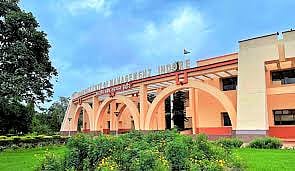IIM-Indore Charts Model To Transform Cancer Care In Emerging Economies
The findings spotlight chronic inefficiencies in chemotherapy services

IIM-Indore Charts Model To Transform Cancer Care In Emerging Economies | IIM Indore
Indore (Madhya Pradesh): Researchers at IIM Indore have unveiled a data-driven framework that could significantly reduce waiting times and enhance hospital efficiency in chemotherapy delivery, offering much-needed relief to cancer care systems strained by the COVID-19 pandemic.
The research, titled Towards Effective Cancer Care Service Delivery Design in Emerging Economies: A Real Case-Based Simulation Study and published in the Journal of the Operational Research Society, has been co-authored by Prof Bhavin J Shah and Prof Hasmukh Gajjar of IIM Indore, along with a faculty member from St Cloud State University, USA.
Drawing on a real case study from a cancer hospital in southern India, the paper develops a simulation model that captures the complexities of inpatient chemotherapy. Unlike existing studies, which largely focus on outpatient treatment, this approach examines inpatient service delivery to help hospitals manage swelling patient loads within tight resource constraints.
ALSO READ
The findings spotlight chronic inefficiencies in chemotherapy services—particularly long waiting times for patients on shorter regimens, which leads to higher bed occupancy and compromised care quality. To tackle these bottlenecks, the researchers tested three interventions: staggered work shifts for oncologists and medical assistants, prioritization of short-duration treatments, and pooling junior oncologists across service lines.
According to the study, these combined measures can reduce waiting times by as much as 93.5%, while nearly 60% of patients could be treated and discharged on the same day—substantially improving hospital bed turnover. The model also demonstrated capacity to handle up to 1.5 times the current patient load if supported with modest adjustments, such as increasing bed strength or shifting more patients to short-duration chemotherapy.
“Faced with a massive post-pandemic backlog, hospitals need flexible delivery models that don’t rely on heavy capital investment. This framework offers administrators actionable tools to reorganize services more effectively,” said the authors.
The implications are far-reaching for emerging economies, where healthcare systems often operate with limited infrastructure. By applying operations research techniques such as discrete-event simulation, the study shows how hospitals can reconcile complex medical procedures with managerial efficiency.
While the researchers acknowledged certain limitations—such as excluding critical end-stage chemotherapy cases—the framework points toward future directions, including better integration of inpatient and outpatient planning and the potential creation of dedicated day-care chemotherapy units.
“As cancer continues to be a global health burden, the study underlines that innovations in care delivery are just as vital as breakthroughs in treatment itself,” said Shah.
RECENT STORIES
-
-
-
-
-